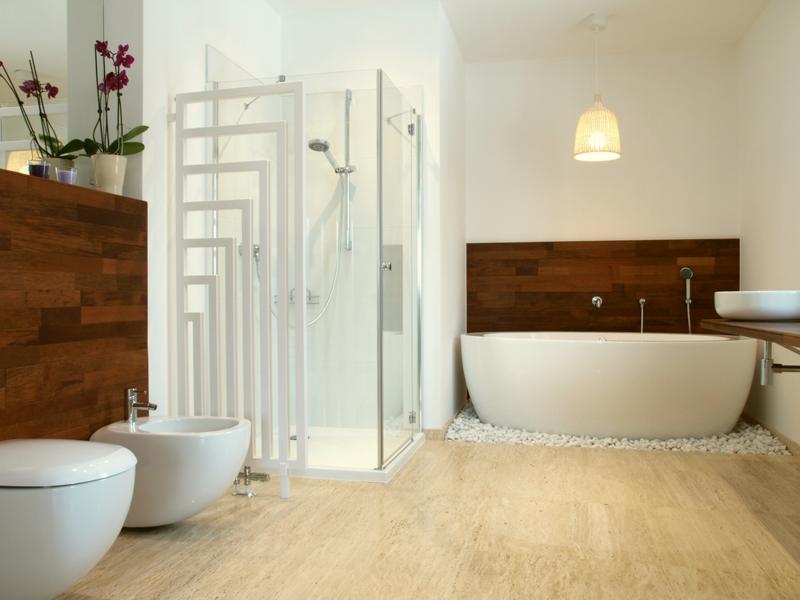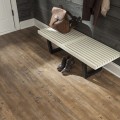Common Vinyl Flooring FAQs
Know your terms
To begin with, here is some vinyl flooring terminology you should know:
- Vinyl flooring – A synthetic flooring material made from a combination of polyvinyl chloride (PVC) and additives like plasticizers, known for its durability, moisture resistance and variety of patterns.
- Luxury vinyl – A higher quality form of tile vinyl that offers the durability and moisture resistance of traditional vinyl flooring but accurately mimics the appearance of natural materials like wood and stone through the use of realistic patterns and textures.
- Subflooring – The bottom-most foundational floor that provides structural support. Vinyl flooring can be applied over it directly or indirectly with the use of underlay.
- Wear layer – Material that is layered over the top surface of vinyl flooring to provide increased resistance to wear and tear.
- Backing – The bottom layer of vinyl flooring that impacts how it’s installed. Different backing materials include felt, vinyl, and fiberglass.
- Adhesive – A bonding material used to attach vinyl flooring to the substrate.
- Substrate – The smooth surface that the vinyl flooring is laid upon, such as wood, concrete, or underlay.
 Vinyl flooring is an ideal choice for bathrooms..
Vinyl flooring is an ideal choice for bathrooms..Why use vinyl flooring?
There are three essential features of vinyl flooring that make it stand out as one of the premier materials for homeowners. First, there are many types of patterns luxury vinyl flooring can come in that will replicate a certain look or ambiance you’re trying to obtain through your floor. For instance, vinyl flooring can display wood, stone or ceramic appearances. Second, it’s an extremely durable surface, especially when it comes to moisture resistance, which is why vinyl flooring is recommended for bathrooms and kitchens. Lastly, vinyl flooring is ideal for DIY installation, regardless of how much experience homeowners have had installing floors in the past.
Any disadvantages to vinyl flooring?
In terms of adding value to your house, vinyl flooring doesn’t add up quite like more natural surfaces such as wood or stone. While vinyl flooring is also noted for its durability, in the event that it does get scratched, it can occasionally be difficult to fully repair, or uninstall entirely. Try to avoid installing vinyl flooring in rooms with heavy sunlight, because repeated exposure over time may cause the finish to fade.
Why should I consider luxury vinyl flooring?
While going with a luxury vinyl flooring option may wind up costing you more up front, it’s important to review the bigger picture of financial considerations. For one thing, luxury vinyl flooring offers you more options when it comes to styles and patterns. It also provides you with added durability, meaning costs for repairs in the future will be less likely. You also need to factor in how long you see yourself living in your current situation. If you only plan on staying in your home for a few years, it’s probably not that important to go with luxury vinyl flooring. However, if you’re looking to stay in a home for at least five years, it’s certainly worth it to spend a little extra on luxury vinyl flooring, which will help save you money on your floor in the long run.
What tools do I need for DIY installation?
“Make sure you have the necessary equipment handy before beginning DIY vinyl floor installation.”There are five essential tools anyone about to install their vinyl flooring needs, and luckily, they won’t necessarily cost you a bundle if you don’t have them. For starters, you’ll need a tape measurer, which will help you determine the dimensions of your surface and visualize how many vinyl tiles or planks you’ll need to comfortably fit each row of your floor. Next, make sure you have a pencil and chalk or chalk line handy to draw out the measurements and proportions of each vinyl square. Make sure you have a strong and sturdy utility knife, which is needed for cutting up the vinyl and corners, as well as a carpenter’s square for measuring the size of your vinyl squares and converting them to the correct measurements. Finally, after you’ve got the vinyl squares accurately divided, you’ll need adhesive to connect the vinyl flooring to the substrate, but only if you’re not using peel-and-stick or a glueless click-lock system. If you do need adhesive for your flooring, make sure you have a floor roller available to smoothly roll in the vinyl.
How much flooring is needed for a room?
Calculating how much vinyl flooring you’ll need for a project is usually simple. First, determine the total square footage of a room by multiplying the length and width of the floor. Add 5-10 percent to this number for wastage just in case – more may be required if your room has a lot of angles and corners that will require additional cuts. Then, look at how many square feet are in each box of vinyl flooring you are looking to purchase. Next, divide the total square footage of flooring you’ll need by the number of square feet in each box. This will tell you how many boxes to purchase.
Should I use a professional installer?
This is an area that largely depends on your experience with floor installation. If the sheer thought of putting together a bed frame sends you shivers, then you’re probably better off leaving your floor up to the professionals. You also need to make sure that you have the necessary equipment handy before beginning installation. If you’re someone who isn’t intimidated by home repair projects, then installing your vinyl flooring should really be no problem. It’s always a good idea to contact a professional flooring installer to better visualize how long a project should take, as well as receive more understanding of which method will fit best with your budget.
Do you have further questions about vinyl flooring? Feel free to contact a knowledgeable BuildDirect product expert. Call 1-877-631-2845 or email sales@builddirect.com, we’d love to hear from you.
Click here to take a look at our stunning online selection of luxury vinyl flooring. Discover the right look for your space.




